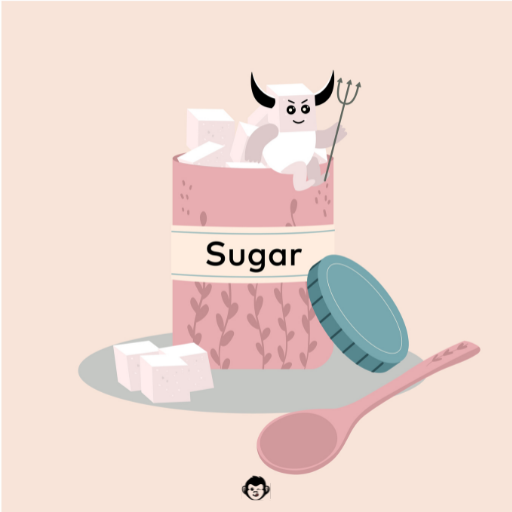4-minute read
Sugar has become the nutrition world's most wanted criminal. But like many complex stories, the truth about sugar isn't as black and white as the headlines suggest. Let's separate fact from fiction and discover whether sugar deserves its villainous reputation.
The Case Against Sugar
The prosecution's evidence is compelling. Excessive sugar consumption has been linked to:
Weight Gain & Obesity: Sugar provides empty calories without satiety signals, making it easy to overconsume. When your body gets more glucose than it can immediately use, it converts the excess to fat for storage.
Blood Sugar Roller Coasters: High sugar intake causes rapid spikes in blood glucose, followed by crashes that leave you tired, irritable, and craving more sugar. This cycle can stress your pancreas over time.
Dental Decay: Oral bacteria feast on sugar, producing acids that erode tooth enamel. The more frequent the sugar exposure, the greater the damage.
Inflammation: Some studies suggest that excessive sugar intake may promote chronic inflammation, potentially contributing to various health issues.
The Defense: Not All Sugars Are Created Equal
But wait—sugar isn't a single entity plotting against your health. There are important distinctions:
Natural vs. Added Sugars: The sugar in an apple comes packaged with fiber, vitamins, minerals, and water. Added sugars in processed foods offer calories without these beneficial companions.
Context Matters: A banana before your workout provides quick energy your muscles will immediately use. The same amount of sugar in a soda while watching TV gets stored as fat.
Dose Makes the Poison: Your body actually needs glucose to function. Your brain alone uses about 120 grams of glucose daily. The problem isn't sugar itself—it's excessive consumption.
The Real Culprits
The true villains in the sugar story are:
Hidden Sugars: That "healthy" granola bar might contain 12 grams of added sugar. Salad dressings, pasta sauces, and bread often harbor surprising amounts.
Ultra-Processed Foods: These products are engineered to hit your "bliss point"—the perfect combination of sugar, salt, and fat that keeps you coming back for more.
Portion Distortion: A single 20-oz soda contains about 65 grams of sugar—more than double the daily recommended limit for women.
Liquid Calories: Your brain doesn't register liquid sugar the same way it does solid food, making it easy to overconsume without feeling full.
The Verdict: Sugar is a Tool, Not a Villain
Think of sugar like fire. In the right amount, at the right time, it's incredibly useful. Too much, at the wrong time, and it becomes destructive.
When Sugar Works For You:
- Pre-workout fuel (banana, dates, or small amounts of honey)
- Post-workout recovery when paired with protein
- Occasional treats that fit within your overall nutrition plan
- Natural sources that come with beneficial nutrients
When Sugar Works Against You:
- Constant snacking on high-sugar processed foods
- Using sugar as your primary energy source
- Consuming liquid sugar regularly
- Eating sugar when you're sedentary
Smart Sugar Strategies
Read Labels: Look for added sugars under names like high fructose corn syrup, cane juice, dextrose, and dozens of other aliases.
Time It Right: Consume sugar when your body can best use it—around workouts or as part of balanced meals.
Choose Quality: When you do have sugar, make it count. Dark chocolate, fresh fruit, or a small portion of something you truly enjoy beats mindless consumption of mediocre sweets.
Focus on Whole Foods: Get most of your carbohydrates from sources that provide additional nutrition—fruits, vegetables, whole grains.
The Bottom Line
Sugar isn't evil, but our relationship with it has become problematic. The real issue isn't the sugar in your morning apple or the honey in your tea—it's the several teaspoons of added sugar a person consumes daily, often without realizing it.
Instead of demonizing sugar entirely, focus on:
- Minimizing added sugars in processed foods
- Timing natural sugars around activity
- Treating sugar as one component of a balanced diet, not the foundation
- Being mindful of liquid sugar sources
The goal isn't sugar elimination—it's sugar education. When you understand how different types of sugar affect your body and when to use them strategically, sugar transforms from a villain into a tool you can wield wisely.
Remember: moderation and context are everything. A life completely devoid of sugar isn't necessarily healthier or more enjoyable than one where sugar plays a small, strategic role in an otherwise balanced approach to nutrition.


